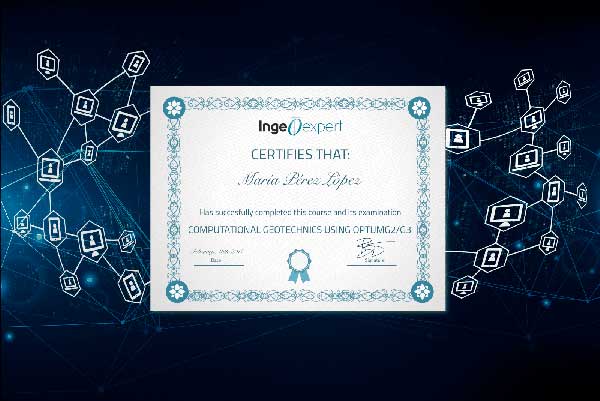Ground modification and soil improvement
50 hours / 6 weeks |
|
Online course |
|
|
Dates: 7th of April to 20th of May Registration period extended until 21st of April
|
| Standard | Unemployed Or Student |
| $313 | $238 |
Introduction
The purpose of this course is to provide knowledge about principles, methods and applications of ground modification and soil Improvement in an easy to understand manner. Prior knowledge of soil mechanics and/or engineering geology is recommended; however, any interested learner may attend the course.
The course starts with an introduction to site conditions requiring ground modification and soil Improvement. Mechanical modification will cover shallow and deep compaction and properties of compacted soils. Hydraulic modification shall present dewatering, guidelines for design of wells, and preloading. Grouting at depth will be discussed to cover categories and materials of grouting. The course includes solved examples and exercises for enhanced understanding.
Online support will be available throughout during the course.
The course is presented through video tutorials and multimedia content within the Moodle virtual platform, with exercises like tests and practical cases.
Objectives
Ground modification and soil improvement plays a major role in case of both new and some existing projects. Through this course, the learner will have an opportunity to understand and be able to apply various techniques of ground modification and soil improvement.
Ground modification and soil improvement is utilized in case of a large number of projects such as building foundations, roads, earth fills, embankments, earth and rock filled dams, and dykes.
Limited places.
Contents tab
Week 1. Introduction to Ground Modification and Soil Improvement
- – Examples of Problematic Site Conditions
- – Possible Alternatives
- – Classification of Ground Modification and Soil Improvement Techniques
Week2 Mechanical modification
- – Purpose of Compaction
- – Methods of Compaction
- – Shallow Compaction
Week3 Mechanical modification
- – Deep Compaction
- – Properties of Compacted Cohesive Soil
- – Properties of Compacted Cohesion-less Soil
Week 4 Hydraulic Modification
- – Objectives
- – Dewatering Methods
- – Open Sumps and Pits
- – Gravitational Flow Wells
- – Suction Dewatering Wells
Week 5 Preloading
- – Objectives of Preloading
- – Preloading Without Vertical Drains
- – Preloading With Vertical Drains
Week 6 Modification at Depth by Grouting
- – Purpose of Grouting
- – Types of Grouting
- – Materials of Grouting
Ahmed Khan
Pr. Ahmed Khan has over 40 years of university teaching, research and professional experience. He taught ground modification and soil improvement and other geotechnical engineering courses including Geology for Engineers, Subsurface Exploration, Geotechnical Engineering, Foundation Engineering, and Dam Design and Construction. He has published numerous research papers, technical reports and a textbook titled Geology for Engineers.
All of our courses are offered 100% online, through our intuitive Virtual Campus. Topics are taught through:
- – Videos
- – Interactive multimedia content
- – Live classes
- – Texts
- – Case studies
- – Evaluation exercises
- – Additional documentation
The content is updated in each new course edition, so that knowledge is acquired around the latest news and state-of-the-art geotechnical engineering technology.
One of the most interesting aspects of our courses is the use of live videoconferences, in which teachers and students interact in a continuous exchange of knowledge and problem solving. In addition to this, students can make use of the platform’s forum, a meeting point where they can interact with teachers and other students.
A tutoring system will also be established by email, which will resolve any possible doubts about the course, and which will serve as a point of connection for students with specific questions on each module.
Students can also download all course documentation, including texts, videos, video conferences and exercises.
The course is designed for a learner expecting to handle soils in case of normal and problematic site situations. Prior basic knowledge of soil mechanics and/or engineering geology is recommended although, the course may be attended by anyone interested. The course will provide a foundation for future development and practice as consultants, designers, and builders. The subject is of great importance and has vast applications. All those who are interested in learning this course are welcome.
Knowledge of MSWORD, Excel, recommended.
At the end of the course, and as accreditation of knowledge acquired and of the technical and practical training, students who correctly complete the corresponding evaluation tests of the geotechnical engineering course will obtain an academic certificate issued by Ingeoexpert. This digital certificate is protected by Blockchain technology, making it unique and tamper-proof, thus enabling companies to verify its authenticity.
It can also be downloaded by students, forwarded by email and shared on social networks, as well as embedded on any website. You can see an example here.
Areas of application include Roads, Embankments, Earth and rock fill dams, dykes, Slopes, and building foundations
- – Designer and builder jobs of ground Improvement systems
- – Superintendent of soil stabilization works
- – Quality control and assurance technicians
- – Technical Instructor
- – Construction supervisor/Inspector
Introduction
The purpose of this course is to provide knowledge about principles, methods and applications of ground modification and soil Improvement in an easy to understand manner. Prior knowledge of soil mechanics and/or engineering geology is recommended; however, any interested learner may attend the course.
The course starts with an introduction to site conditions requiring ground modification and soil Improvement. Mechanical modification will cover shallow and deep compaction and properties of compacted soils. Hydraulic modification shall present dewatering, guidelines for design of wells, and preloading. Grouting at depth will be discussed to cover categories and materials of grouting. The course includes solved examples and exercises for enhanced understanding.
Online support will be available throughout during the course.
The course is presented through video tutorials and multimedia content within the Moodle virtual platform, with exercises like tests and practical cases.
Objectives
Ground modification and soil improvement plays a major role in case of both new and some existing projects. Through this course, the learner will have an opportunity to understand and be able to apply various techniques of ground modification and soil improvement.
Ground modification and soil improvement is utilized in case of a large number of projects such as building foundations, roads, earth fills, embankments, earth and rock filled dams, and dykes.
Limited places.
Contents tab
Week 1. Introduction to Ground Modification and Soil Improvement
- – Examples of Problematic Site Conditions
- – Possible Alternatives
- – Classification of Ground Modification and Soil Improvement Techniques
Week2 Mechanical modification
- – Purpose of Compaction
- – Methods of Compaction
- – Shallow Compaction
Week3 Mechanical modification
- – Deep Compaction
- – Properties of Compacted Cohesive Soil
- – Properties of Compacted Cohesion-less Soil
Week 4 Hydraulic Modification
- – Objectives
- – Dewatering Methods
- – Open Sumps and Pits
- – Gravitational Flow Wells
- – Suction Dewatering Wells
Week 5 Preloading
- – Objectives of Preloading
- – Preloading Without Vertical Drains
- – Preloading With Vertical Drains
Week 6 Modification at Depth by Grouting
- – Purpose of Grouting
- – Types of Grouting
- – Materials of Grouting
Ahmed Khan
Pr. Ahmed Khan has over 40 years of university teaching, research and professional experience. He taught ground modification and soil improvement and other geotechnical engineering courses including Geology for Engineers, Subsurface Exploration, Geotechnical Engineering, Foundation Engineering, and Dam Design and Construction. He has published numerous research papers, technical reports and a textbook titled Geology for Engineers.
All of our courses are offered 100% online, through our intuitive Virtual Campus. Topics are taught through:
- – Videos
- – Interactive multimedia content
- – Live classes
- – Texts
- – Case studies
- – Evaluation exercises
- – Additional documentation
The content is updated in each new course edition, so that knowledge is acquired around the latest news and state-of-the-art geotechnical engineering technology.
One of the most interesting aspects of our courses is the use of live videoconferences, in which teachers and students interact in a continuous exchange of knowledge and problem solving. In addition to this, students can make use of the platform’s forum, a meeting point where they can interact with teachers and other students.
A tutoring system will also be established by email, which will resolve any possible doubts about the course, and which will serve as a point of connection for students with specific questions on each module.
Students can also download all course documentation, including texts, videos, video conferences and exercises.
The course is designed for a learner expecting to handle soils in case of normal and problematic site situations. Prior basic knowledge of soil mechanics and/or engineering geology is recommended although, the course may be attended by anyone interested. The course will provide a foundation for future development and practice as consultants, designers, and builders. The subject is of great importance and has vast applications. All those who are interested in learning this course are welcome.
Knowledge of MSWORD, Excel, recommended.
At the end of the course, and as accreditation of knowledge acquired and of the technical and practical training, students who correctly complete the corresponding evaluation tests of the geotechnical engineering course will obtain an academic certificate issued by Ingeoexpert. This digital certificate is protected by Blockchain technology, making it unique and tamper-proof, thus enabling companies to verify its authenticity.
It can also be downloaded by students, forwarded by email and shared on social networks, as well as embedded on any website. You can see an example here.
Areas of application include Roads, Embankments, Earth and rock fill dams, dykes, Slopes, and building foundations
- – Designer and builder jobs of ground Improvement systems
- – Superintendent of soil stabilization works
- – Quality control and assurance technicians
- – Technical Instructor
- – Construction supervisor/Inspector
8 reviews for Ground modification and soil improvement
More info
Finish this course and get a certificate based on Blockchain
Ground modification and soil improvement

Blockchain technology makes the certificate incorruptible, enabling companies to verifiy its autenticity.
Ground modification and soil improvement
| $313 | $238 | |
| Get more information |




Dave Dyet –
Course content was really interesting
Mohammadhashem Arabzadeh –
It´s a perfect course!
Ron Gabriel Navarro –
I like the prompt feedback given by Dr Ahmed Khan on my submitted works. Thank you Dr. Ahmed Khan for this course. I definitely learned a lot of new concepts under geotechnical engineering.
PHINDULO MUGOVHANI –
This is a really nice course for someone who is in the Geotechnical Engineering field, i learnt a lot from this course, the content of the course was something i was looking for.
Sultan Al Shafian –
Good course for basic understanding of ground improvement technologies.
Alistair Kaldy –
Very clearly presented and very practical.
The variety of techniques and how to design them for the various ground issues.
Karthikeyan Ganesan –
The Professor’s knowledge and various case studies he was sharing was really helpful.
Lisa Turner –
The professor was very nice and knowledgeable.